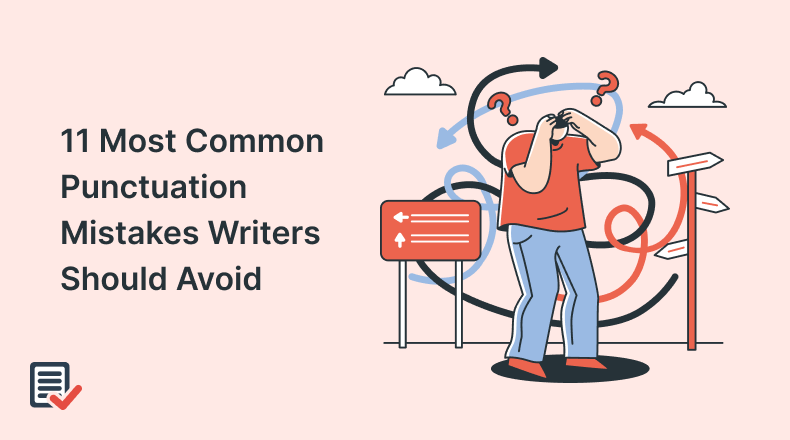
Do you find yourself constantly battling a flood of mistakes that seem to ruin your writing? After hours of pain and sweat writing your article, there is an error glaring at you when you hit “publish.”
Sound familiar? You’ve experienced this often. But this isn’t the only hurdle to creating great content. You’d be surprised how often writers fall into the same traps when producing content for their readers.
With that in mind, we’ve compiled a list of the most frequent mistakes and practical tips to help avoid them before starting your next piece. Let’s get straight into it!
Most Frustrating Writing Mistakes
1. Misusing Punctuation Marks
The risks and impropriety of punctuation mistakes arise from their misuse. Misuse of such marks often confuses the text’s original meaning and makes it challenging to comprehend. On the other side, using punctuation marks properly can enhance text’s readability.
Without their proper usage, your writing becomes clumsy and unpleasant. It’s not difficult to avoid such a mistake. You can quickly know how and where these marks can easily be added with proper practice of grammar rules.
2. Overloading Sentences with Jargon
Jargon can be confusing, especially for those unfamiliar with the topic. Too much jargon can make it difficult for others to understand your message. You can avoid jargon by using the more familiar terms in place of them.
Being clear and concise is essential no matter what you are writing or for whom. So, state your point clearly and concisely, without unnecessary words, phrases, or clauses.
3. Vague Language
What is vague language? Use of wording that is imprecise, undefined, or lacks explicitness, which can fail to convey a clear meaning and may lead to misunderstandings or confusion for a reader. This kind of language makes your writing weak.
You can enhance your writing clarity by carefully selecting your words. The best way to prevent misunderstandings or ambiguity is to be more specific in your language. Moreover, use terms and words that are easily readable so that reader can get their meaning and comprehend your message effectively.
4. Overusing Adverbs
Overusing adverbs in writing is a bad mistake because it can make your text feel weak or wordy. This part of speech, especially those that end in “-ly,” is frequently used to modify verbs or adjectives, but when used excessively, it dilutes the message.
For instance, saying “She ran quickly” can be less effective than saying “She sprinted,” which conveys more power and precision without needing an adverb.
5. Writing in Passive Voice
Good writing is clear, direct, and engaging. One of the critical aspects of achieving this is to use the active voice instead of the passive voice. While passive voice isn’t grammatically incorrect, it can make your sentences sound weak and less engaging.
It’s common to see a passive voice when the object is at the beginning of a sentence instead of at the end. When the object is at the beginning, the verb is happening to the object instead of causing the verb. To fix this error, the sentence should be rewritten in the active voice.
6. Inconsistent Tone and Style
It’s easy to get confused between these two elements because they are closely related. Tone expresses the writer’s viewpoint, where as style describes the writing. It refers to how you shape your work to make it come alive, as well as your word choices and sentence structure.
Switching between formal and casual language or suddenly changing your way of writing can make your work seem unprofessional. This causes your readers to distrust the reliability of your write-up, which may result in a loss of credibility.
7. Skipping Proofreading
This is the most essential step, we all mostly skipped and overlooked. Proofreading is the last step, and mostly, in the end, we all are tired from these steps: research, reading and writing.
These steps pushes to neglect the editing process. But are you 100% sure about your writing and feel skipping proofreading and editing steps is a good habit?
Probably not! We mostly made mistakes and proofreading helps us to point out. Once you finish writing, review it with full concentration to locate the loopholes.
How Can You Avoid These Common Mistakes?
Writing mistakes, especially grammatical errors, can significantly affect your content clarity and quality. Whether it’s an essay, article, or email, if your material has any sort of grammatical, typo or spelling error, it can create confusion.
To avoid these issues, you must focus on grammar rules, sentence structure, and punctuation. However, manually identifying every mistake can be time-consuming and difficult, particularly for those not well-versed in grammar.
This is where an online grammar checker can offer assistance, as it can automatically detect and suggest corrections for writing mistakes. It will scan the text deeply and highlight areas for improvement. By following the suggestions, you can ensure clarity and quality in your write-ups.
Conclusion:
Writing is more important in everyday life, whether for personal stuff or work. Whether you’re sending an email, putting together a report, or trying to write for yourself, being able to express yourself clearly in your write-up does matter. But mostly, we made some common mistakes that can annoy others while reading our material and lessen the power of our writing. You can boost your writing and improve your skills by knowing about these mistakes and using the tips mentioned above.






![20 Most Common Grammar Mistakes & How to Avoid Them [With Examples]](https://www.check-plagiarism.com/blog/wp-content/uploads/2024/11/790-X-440.png)